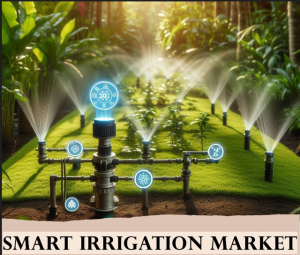The smart irrigation market is projected to grow from USD 1.8 billion in 2024 to USD 3.0 billion by 2029, with a compound annual growth rate (CAGR) of 11.2% during this period. This growth is primarily driven by an increasing number of government initiatives focused on water conservation. Additionally, the declining cost of smart irrigation systems is expected to create significant growth opportunities for market players in this sector.
Smart irrigation systems are pivotal in integrating emerging technologies like the Internet of Things (IoT), Artificial Intelligence (AI), and Machine Learning (ML). These integrations revolutionize water management in agriculture and landscaping, making these systems more efficient, precise, and user-friendly. IoT enables various devices and sensors within the smart irrigation systems to communicate and share data, facilitating real-time monitoring and control based on comprehensive data analysis. This connectivity optimizes water usage by adjusting irrigation in real-time. AI and ML algorithms further enhance these systems by analyzing vast amounts of sensor data to predict optimal irrigation times and amounts, learning from historical data, and adapting to changing conditions to improve efficiency and crop yield over time. These advancements highlight the critical impact of smart irrigation systems, creating significant growth opportunities for market players over the next five years.

Download PDF Brochure @ https://www.marketsandmarkets.com/pdfdownloadNew.asp?id=199758913
The sensor component of the smart irrigation market is anticipated to grow at the highest CAGR during the forecast period. This growth is driven by factors such as changing climatic conditions, stricter environmental regulations, and the need to enhance crop productivity. Advances in wireless technologies, including the integration of Wi-Fi or cloud-based systems with soil moisture sensors for real-time field data, and the use of GPS for tracking irrigation machinery, are also contributing to market expansion. Additionally, the increasing adoption of soil moisture sensors, rain sensors, and fertigation sensors for irrigation scheduling on farms is expected to fuel market growth throughout the forecast period.
The weather-based system type is expected to dominate the market size during the forecast period. This is due to its growing popularity among homeowners, commercial building contractors, and managers of landscaping and golf courses. The rapid development of the non-residential segment has significantly boosted the demand for weather-based controllers. Additionally, the increasing need to adjust irrigation based on soil characteristics and water pressure is driving the market growth of weather-based systems during this period.
Ask for Sample Report @ https://www.marketsandmarkets.com/requestsampleNew.asp?id=199758913
Key players in the smart irrigation market include industry leaders such as The Toro Company, Rain Bird Corporation, Netafim, Hunter Industries Inc., and HydroPoint. These companies are renowned for their innovative solutions and strong geographical presence, driving the adoption of smart irrigation systems globally. By focusing on both organic growth strategies, such as developing advanced technologies, and inorganic strategies, including mergers and acquisitions, these key players continue to strengthen their market position and expand their influence in the smart irrigation sector.
